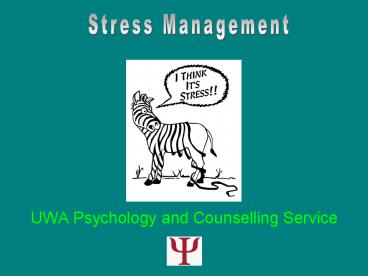UWA Psychology and Counselling Service - PowerPoint PPT Presentation
1 / 21
Title:
UWA Psychology and Counselling Service
Description:
... Psychology and Counselling Service. Stress Management. Definition. Our body's response to the demands made ... Maxi shutdowns relaxing holidays. Ask yourself: ... – PowerPoint PPT presentation
Number of Views:72
Avg rating:3.0/5.0
Title: UWA Psychology and Counselling Service
1
Stress Management
- UWA Psychology and Counselling Service
2
Definition
- Our bodys response to the demands made on it
- It occurs when we perceive these demands to
exceed our own personal and social resources
3
Why so stressed?
- Stress is an automatic, evolutionary response
designed to help us respond to threats - The fight or flight response is responsible for
our sweaty hands, heart racing etc
4
Stress and the Body
Mind becomes alert
Blood clotting and blood pressure increases
Digestion slows down
Immune response decreases
Sweating increases
Blood diverts to muscles and away from major
organs
Liver releases sugar for energy
Breathing rate increases
5
Chronic stress causes
- Problems with digestion such as irritable bowel
syndrome - Susceptibility to flu and colds
- Lowered libido
- Sugar cravings because our liver is still
releasing sugar poor diet - Fatigue and anxiety due to the mind being
constantly on the alert
6
- Add diagram here
7
Common stressors
- External
- Physical environment
- Social
- Organisational
- Major Life Events
- Daily hassles
- Internal
- Lifestyle
- Negative self talk
- Mind traps
- Personality traits
8
Recognising your stress fractures
9
What Can be Done About Stress?
- Relaxation Training
- Cognitive Behaviour Therapy
- techniques
- Lifestyle Changes eg. Diet,
- exercise, sleep
- Time Management Techniques
- Psychotherapy/ Counselling
10
Stress Management - Exercise
- Reduces tension in your body and mind
- Releases endorphins
- Reduces fatigue
- Improves concentration
- Make it regular, make it sustainable and make it
FUN!
11
Stress Management - Nutrition
- Avoid stress food and drink caffeine, salt
and sugar - Eat body supporting foods
- Give yourself the best chance avoid using
alcohol to de-stress
12
Shutdowns Vs Meltdowns
- Mini shutdown 10 -15 min breaks
- Medium shutdowns weekend off
- Maxi shutdowns relaxing holidays
- Ask yourself
- What have I done in the past 24 hours that has
given me pleasure? - What will I do in the next 24 hours that will
give me pleasure?
13
Relaxation
- Switches on parasympathetic nervous system
- Stress response cannot be activated at the same
time as relaxation response - Find out what works for you
- Abdominal Breathing,
Visualisations, Progressive Muscle Relaxation,
Yoga, Meditation
14
Stress All in your head??
- Irrational thinking
- Pessimism
- Self blaming Im useless
- Perfectionism
- All or Nothing thinking
- Catastrophising - What if
- The Shoulds
- Helplessness I cant cope
15
Time Travelling
- Do you find yourself
- Recalling past failures, mistakes, weaknesses..
- Imagining future failures and
what - will go wrong, how
people will think about you negatively.. ??
16
Ask yourself
- Are you jumping to conclusions?
- Can you expect to be perfect in everything you
do? - Is this thought helpful?
- Are you forgetting the positives?
- Are you being fair to yourself?
- Are you expecting the worst?
- Are you sure this is really going to happen?
- How would someone else think about the situation?
17
Time Management
- Write a list and decide on your
- priority task
- Break big task down into small steps
- Make a commitment to start the task at a set
time, even for just 20 minutes - Anticipate what will prevent you from getting
started negative thoughts, all or nothing
thinking, the Internet!
18
Assertiveness
Passive
WHICH ONE ARE YOU?
Aggressive
Passive
Isolation, guilt, low self esteem, causes
conflicts
Resentment, anger, low self esteem, blame,
martyr, people pleaser
Assertive
A healthy balance between self and others
19
The Big Picture
- Awareness of your stress signs
- Exercise and Fun
- Supportive nutrition
- Rest and Sleep
- Relaxation
- Helpful Thinking Styles
- Time Management
- Assertiveness
- Social Support
20
General Guidelines for Stress Management
- Make a personal commitment to the management of
stress - Recognise stress management as being unique for
each of us - Be patient and take time to change
- Use proven stress management techniques
- Approach stress management one step at a time
smaller changes first
21
And if all else fails
Just Breathe!































